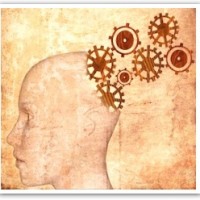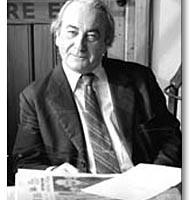P is for poison, by Roger Scruton
People poison themselves through consuming stuff that harms them. They also poison the world, by spreading venomous thought, venomous entertainment, and venomous waste. It is a strange feature of our societies that governments increasingly seek to control the first kind of poison, which threatens only the individual, while largely ignoring the second kind, which threatens us all. The reason for this lies in a deep disorder within democracies — namely the fear of moralizing, which leads legislators to order us about for the good of each of us, but never for the good of all.
We go a little way to understanding the matter if we consider the three great public poisons of our time, what they are doing to us, and why we find it so difficult to take action against them: political correctness, pornography, and plastic. The first poisons thought, the second poisons love, and the third poisons the world. Between them they put in question whether human life as we know it will survive, and whether it ought to survive, given what it will look like when the poisons have done their work.
Political correctness means soft censorship — censorship with penalties soft enough to be spread across us all. When people burned each other at the stake for uttering forbidden thoughts, they were also careful to draw a precise distinction between the forbidden and the permitted, so as to confine the danger. When the only penalty for uttering forbidden thoughts is to lose your job as a journalist, or your promotion in the academy, then the task of defining the forbidden area becomes less urgent. Moreover, for that very reason, the poison spreads rapidly through society, so that there is no longer any easy way to avoid it. When “homophobia” or “Islamophobia” are mere name-calling, without clear legal consequences for the victim, they can be used indiscriminately to ruin the career of whosoever might have stumbled, by whatever accident of fate, into the target area. When words become deeds, and thoughts are judged purely by their expression, and not by the arguments advanced in their favor, then there is no clear way of debating the issues of the day, however vital they might be. A universal caution invades the intellectual life; people mince their words, sacrifice style and grace for the clumsy armor of “inclusive” syntax, avoid all the areas where orthodoxies have taken root — sex, race, gender, religion, patriotism — and beat around bushes in which nothing hides.
It is thanks to political correctness that the academy has been overwhelmed by pseudo-scholarship. It is thanks to political correctness that the British government has adopted gay marriage as its policy, even though it never proposed this to the electorate. It is thanks to political correctness that a hospital worker can, in Britain, leave a patient unattended in order to say salat, but not perform his or her hospital duties while wearing a cross. In a hundred little ways our traditional forms of life are being censored out of existence. Every now and then there is a show trial conducted in order to remind the people of this, as when Larry Summers was driven from his position at Harvard for having dared to suggest that the brains of women are differently organized from the brains of men.
The poison of pornography has something in common with the poison of political correctness, namely that it is not noticed as a poison by those who promote it. The astonishing thing, indeed, is that American opinion formers have to be persuaded of the damage that pornography is inflicting. They have to be confronted with the overwhelming body of research, well known to the psychological community and in any case no more than common sense, which shows that porn is addictive, destructive of sexual confidence, undermining of sexual relations, and promoting of an entirely abusive and objectified view of women in particular and human beings in general. Not only is porn driving all romance and hesitation from the expression of sexual desire; it is reconfiguring that desire, so that it is no longer a free gift between persons but a form of enslavement.
It is right to see porn as a poison, because its effects cannot be confined. The addiction is only the smallest part of it. Far worse is the destruction inflicted on the emotional life and on the capacity to love. A difficult discipline, on which the future of society depends, and to which previous generations devoted all that was best in their nature, is being placed beyond the reach of young people. And as a result their emotional lives are increasingly disordered. (If you don’t believe this, then you must read the definitive account in James Stoner and Donna Hughes, The Social Costs of Pornography, Princeton, Witherspoon Institute, 2010.)
Read the complete article in Catholic Education
Neuroscience wants to be the answer to everything. It isn’t., by Roger Scruton
There are many reasons for believing the brain is the seat of consciousness. Damage to the brain disrupts our mental processes; specific parts of the brain seem connected to specific mental capacities; and the nervous system, to which we owe movement, perception, sensation and bodily awareness, is a tangled mass of pathways, all of which end in the brain. This much was obvious to Hippocrates. Even Descartes, who believed in a radical divide between soul and body, acknowledged the special role of the brain in tying them together.
The discovery of brain imaging techniques has given rise to the belief that we can look at people’s thoughts and feelings, and see how ‘information’ is ‘processed’ in the head. The brain is seen as a computer, ‘hardwired’ by evolution to deal with the long vanished problems of our hunter-gatherer ancestors, and operating in ways that are more transparent to the person with the scanner than to the person being scanned. Our own way of understanding ourselves must therefore be replaced by neuroscience, which rejects the whole enterprise of a specifically ‘humane’ understanding of the human condition.
In 1986 Patricia Churchland published Neurophilosophy, arguing that the questions that had been discussed to no effect by philosophers over many centuries would be solved once they were rephrased as questions of neuroscience. This was the first major outbreak of a new academic disease, which one might call ‘neuroenvy’. If philosophy could be replaced by neuroscience, why not the rest of the humanities, which had been wallowing in a methodless swamp for far too long? Old disciplines that relied on critical judgment and cultural immersion could be given a scientific gloss when rebranded as ‘neuroethics’, ‘neuroaesthetics’, ‘neuromusicology’, ‘neurotheology’, or ‘neuroarthistory’ (subject of a book by John Onians). Michael Gazzaniga’s influential study, The Ethical Brain, of 2005, has given rise to ‘Law and Neuroscience’ as an academic discipline, combining legal reasoning and brain imagining, largely to the detriment of our old ideas of responsibility. One by one, real but non-scientific disciplines are being rebranded as infant sciences, even though the only science involved has as yet little or nothing to say about them.
Read the complete article in CERC.
Who was the most right-wing man in history?, by Paul Johnson.
The recent death of Michael Wharton, aged 92, raises the interesting question: who was the most right-wing person who ever lived?
Many thought he was. I am not sure he did himself. The last time I saw him, when he was already very old, I asked him how he saw himself and he replied, ‘Moving to the right.’ He said this as if regretting a life of obstinate radicalism, though as the honorary editor-in-chief of the Feudal Times and Reactionary Herald for more than half a century it was always difficult to get to the right of him (I tried) in any issue on the political agenda. On other matters he resembled Gilbert Pinfold (or his creator, Evelyn Waugh) and ‘abhorred … everything that had happened in his lifetime’.
Wharton’s own hero was Colonel Charles de Laet Waldo Sibthorpe (1783–1855), MP for many years for Lincoln, a borough represented previously by his elder brother, father, great-uncle, great-great-uncle, and after his death by his eldest son. He served in the Peninsular war, in the 4th Dragoon Guards, and inherited Canwick Hall and the family estate in Lincolnshire; by his wife, Maria, heiress of Ponsonby Tottenham, he acquired another estate in Ireland. The DNB says, ‘He belonged to the ultra-Tory and ultra-protestant party, and was the embodiment of old-fashioned prejudice.’ He was one of the diehard group of 53 Tories who censured free trade in 1852. His one parliamentary success was to get the proposed grant to Prince Albert reduced by half on the grounds that he promoted ‘foreign influence’, and he opposed the Great Exhibition for the same reasons. Otherwise he sounds pretty tame, though one would like to know what was meant by the statement, ‘His appearance was extraordinary and his dress attracted attention.’
Twentieth-century equivalents of Sibthorpe are increasingly rare. An undergraduate friend of mine who made lists of them used to award the prize to Sir Waldron Smithers, an eccentric traditionalist who sat for seats in Kent from 1924 to his death in 1954. His place was taken by Captain Waterhouse MP, who for some years led a cave of diehards called ‘the Suez Group’. But I heard it said that Waterhouse, though ‘splendid’ on the Middle East, was ‘unreliable’ on some issues, being ‘not sound’ on animal rights. Julian Amery, indeed, told me he was ‘well to the right’ of the captain. But then he himself was ‘unsound’ on capital punishment, since his brother John had been shot in the Tower in 1945. Few people have ever been ‘sound’ across the whole spectrum. Even the Duke of Cambridge was not, by his own admission, a last-ditcher. As he put it, ‘They say I am against reform. I am not against reform. There is a time for everything. And the time for reform is when it can no longer be resisted.’ Ramrod-straight and unflinchingly regimental, did he not harbour a cosy, sentimental streak? He was once heard to observe, ‘fists on his knees’, that ‘family prayers are a damned fine institution, by God!’
There is always a weak spot in every reactionary. C.S. Lewis told me, when ambling through Addison’s Walk at Magdalen, that Joseph de Maistre was the ideal right-winger. He thought the most important official in the state was le bourreau, the executioner, ultimate guarantor of order. There were three divine laws of society: monarchy is a necessity; the monarch must be absolute; his duty is to uphold papal supremacy. De Maistre is the only political philosopher who is consistently shrewd. He coined the axiom, ‘Every country has the government it deserves.’ But Lewis thought de Maistre’s wit was his weakness: ‘A true reactionary has no sense of humour. You must be able to propose the impossible with a straight face.’ Michael Wharton, of course, would not have agreed with that. He took the Chestertonian line that all truth was encoded in a joke, a view shared by Ronald Reagan, the most successful right-winger of modern times, who communicated entirely through one-liners and had over 5,000 of them, by heart, for every conceivable occasion.
Read complete article in Catholic Education Resource Center


